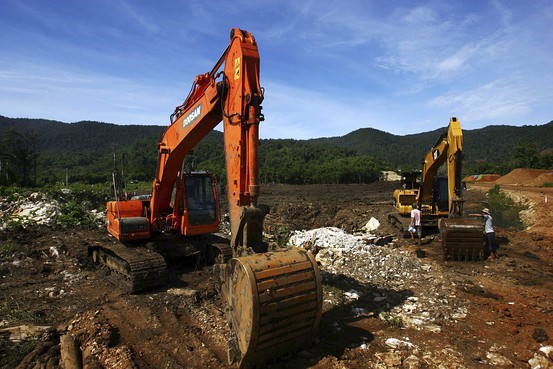Indonesia May Cut Mineral-Concentrate Export Duty as Standoff With Miners Persists
Post Date: 03 Mar 2014 Viewed: 411

Indonesia is considering reducing its export duty on mineral concentrates, a government official said Sunday, in a sign that Jakarta is backing down following a standoff with major international miners which have opposed the controversial tax.
The government will consider reducing the duty for miners who are "serious" about smelting their mineral concentrates in the country before shipping the metals to buyers abroad, Deputy Minister of Energy and Mineral Resources Susilo Siswoutomo told The Wall Street Journal Sunday.
The tax cuts would be decided on a "case by case basis," Mr. Siswoutomo said. "It's being evaluated and it could be different for each company."
Indonesia, a major source of commodities such as nickel ore, bauxite, tin, copper and thermal coal, last month banned exports of raw mineral ores in a drive to force miners to do the lucrative work of refining within the country. The export ban was aimed at helping the sprawling nation move its economy up the value chain.
In addition to the ban, the government also in January started to impose export duties on mineral concentrates of copper, iron, zinc, and manganese of between 20% and 25%, which would be progressively raised to 60% by late 2016.
Miners in Indonesia typically smelt a relatively small part of their minerals in the country. They have argued that producing the metal from its ore isn't economical in the country and that they can't compete with smelters in the region, such as those from China.
Meanwhile, companies and experts have warned that the mineral export ban could lead to massive layoffs and lower tax revenues at the time when the economy is slowing and the country will hold parliamentary elections in June and a presidential poll in July.
Copper companies Freeport-McMoRan Copper & Gold Inc. FCX -2.54% and Newmont Mining Corp. NEM -1.40% said that the Indonesian government's demand that they process copper with high purity levels was economically unfeasible and that the taxes on their copper concentrates was a breach of their contracts with the government.
Phoenix-based Freeport said in a recent regulatory filing in the U.S. that its unit PT Freeport Indonesia may declared force majeure if it wasn't able to resolve the disagreement over the export tax.
Companies often invoke force majeure clauses in contracts when unforeseen circumstances such as fires, natural disasters and wars prevent them from meeting delivery deadlines. Freeport Indonesia, the single-largest tax payer in the country, has several times in recent years declared force mejeure due to a fatal accident and labor strikes at its mining operations in Papua, a remote province in eastern Indonesia.
Although discussions with the Indonesian government continue, Freeport said in the filing that if normal operations don't resume it may take actions including laying off workers, deferring capital expenditure plans and cutting operating costs.
Freeport Indonesia's Chief Executive Rozik Soetjipto told The Wall Street Journal on Sunday that he would welcome a cut in the export duty but declined to say if the company would be willing to pay a reduced tax.
"We have informed the government about our seriousness in [the possibility of] building of a smelter and other things. We are waiting for the government's response," Mr. Soetjipto said. He referred to a recent agreement with state-owned PT Aneka Tambang to explore building a smelter. Currently only 40% of Freeport's copper concentrates are smelted in Indonesia.
Other industry watchers agreed that the government may have imposed the controls on the mineral industry too quickly without due consideration.
"Freeport [Indonesia is] a big tax payer. Under the current situation, losing a big tax payer is a big loss," University of Indonesia economics lecturer Muhammad Ikhsan said.
Deputy Chairman of the Indonesian Mining Association Tony Wenas said Sunday the export duty was "inappropriate" as there weren't enough smelters in the country to process the mineral concentrates.
Newmont's President and CEO Gary Goldberg said in a Jan. 31 conference call with analysts that it would consider taking legal action to protect its rights.
"It's our preference to avoid arbitration while ensuring continued respects for the Contract of Works," Mr. Goldberg said.
Newmont's Indonesian outfit PT Newmont Nusa Tenggara, which operates the copper and gold Batu Hijau mine on central Indonesia's island of Sumbawa, smelts only 30% of its copper concentrates in Indonesia. But it claims that more than 95% of the value of the copper it mines is realized through mining and processing operations that support 9,000 jobs.
Mr. Siswoutomo declined to comment on the latest Freeport and Newmont statements.



